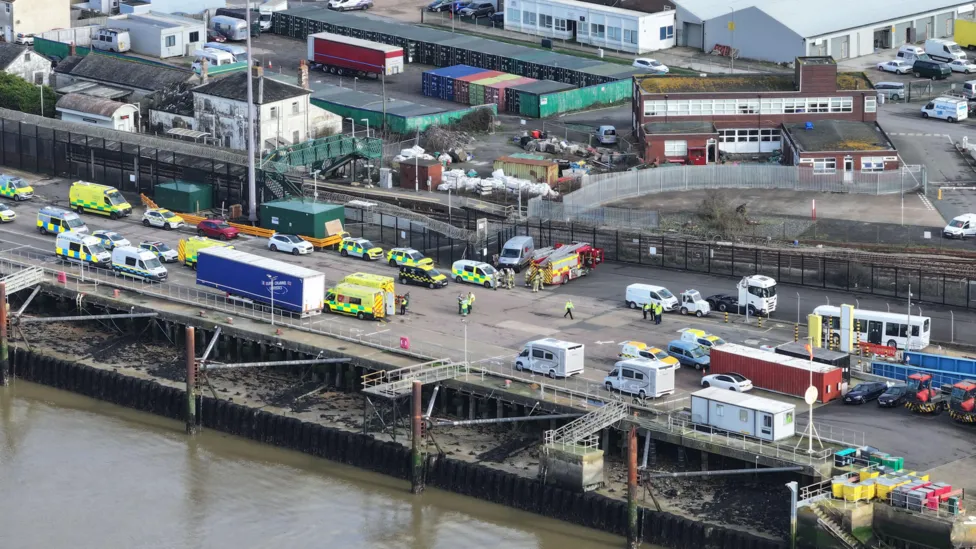THE ONGOING trial of a Swansea man accused of smuggling migrants into the UK has revealed more than just the harrowing conditions faced by those involved. It has also brought to light a complex network of business connections spanning South Wales, raising questions about the true nature of these operations and their links to unlawful activities.
The trial of 43-year-old Anas Al Mustafa at Lewes Crown Court has gripped public attention. Al Mustafa, who moved to the UK from Syria in 2011 and now resides in Swansea, is charged with assisting unlawful entry into the UK. The charges stem from an incident on 16 February, when seven migrants were discovered concealed in a refrigerated van on a ferry from Dieppe to Newhaven. Jurors heard that the migrants were found in a dangerously small, airless compartment, screaming for help as they ran out of oxygen.
Prosecutors argued that Al Mustafa played a key role in the smuggling operation, with evidence suggesting he was aware of the human cargo in his vehicle. Although Al Mustafa claims he was merely a driver unaware of the migrants, his suspicious behaviour during the rescue operation and the unusually high payment he received for the job have cast doubt on his defence.

Beyond the immediate details of the smuggling operation, the trial has drawn attention to Al Mustafa’s extensive business connections in South Wales. Al Mustafa is linked to several companies across the region, with ties to Swansea, Cardiff, and Bedwas. These connections suggest a network of businesses that may be involved in activities beyond their stated purposes.
Al Mustafa was previously the director of A & T Food Transport Ltd., a company registered at 22 Caepistyll Street in Swansea. The company, which operates out of a property owned by Coastal Housing Group, raises questions about the legality of running businesses from social housing. Al Mustafa resigned from this position in September 2023, passing control to Mohammad Mustafa al Mustafa, a Swedish national believed to be a relative.

Investigations have revealed that this is just one of several businesses associated with Al Mustafa. Other companies include Amana Accountant Ltd. and Pure General Trading Ltd., both of which have connections to properties owned by Swansea Council. The frequent changes in directors, addresses, and the apparent lack of substantial financial activity within these businesses have raised suspicions about their true purpose.
The business connections extend to Cardiff, where A & T Food Transport’s Certificate of Incorporation lists an address in St Mellons. Al Mustafa’s personal address in Cardiff is linked to Somarz Properties LLP, a company that has seen a significant and unexplained increase in investments, further complicating the web of financial dealings surrounding these individuals.
In Bedwas, Al Mustafa was involved with A & B Marble Ltd., a company trading under the name Royal Marble. Despite claims of over 20 years of experience in the marble and granite industry, the company’s financial records and online presence suggest otherwise. The discrepancies between the company’s stated history and its actual operations, including the lack of significant assets, add to the growing list of concerns.
The ongoing trial of Anas Al Mustafa has brought to light not only the dangers faced by migrants attempting to enter the UK but also a complex network of business operations across South Wales. These businesses, linked by common directors and questionable financial activities, raise concerns about their role in the broader context of unlawful activities.
Jurors have heard how the crew on the Dieppe-Newhaven ferry heard pleas from the van on 16 February and used an axe to break down a fake partition to get them out.
Mr Al Mustafa said it was the “most difficult day of his life”.
Speaking through an Arabic interpreter in court on Thursday (Aug 22), he said: “I remember only certain scenes of what was going on. I saw a person throwing up. I saw them when they were getting the people inside to outside. It was a shock to me.”
The court previously heard how, in Syria, he had been introduced to a man called Badr who said he needed him to do a job driving a van.
Jurors were also told Mr Al Mustafa said he had previously been paid £500 to drive a van to Liverpool, but for the February job, he was being paid £5,000 to drive the van to the UK.
The court heard Mr Al Mustafa told police, in an interview with no interpreter, he did not know there were people in the van, but because he was being paid £5,000, he thought “maybe this time there is people inside”.
In court, however, Mr Al Mustafa said the £5,000 sum was incorrect and he meant £500.
He said he did not remember telling police he thought maybe people were in the van and he didn’t know why he said that.
The father-of-two said: “My problem is not what we spoke in there (interview) I didn’t understand. When it was being read here, I noticed there are things I can’t remember I said, and what I said is not correct even.”
The court heard he had been offered an interpreter for the police interview, but after he was told one was not available then, he said he would try in English.
Asked if he knew there were illegal immigrants in the van, the self-employed builder said: “No, only after it was discovered.
“I don’t need to do that kind of job.
“I have my business. I have my company. I have my accounts and I have proof of accounts for 13 years. Why would I do something that is illegal?”
Further revelations may soon emerge in court about the extent of Al Mustafa’s involvement in these businesses and their connections to the smuggling operation. The case serves as a reminder of the intricate and often hidden networks that can operate behind seemingly legitimate enterprises, with potential implications for law enforcement and public trust in business practices across the region.
The trial continues.















